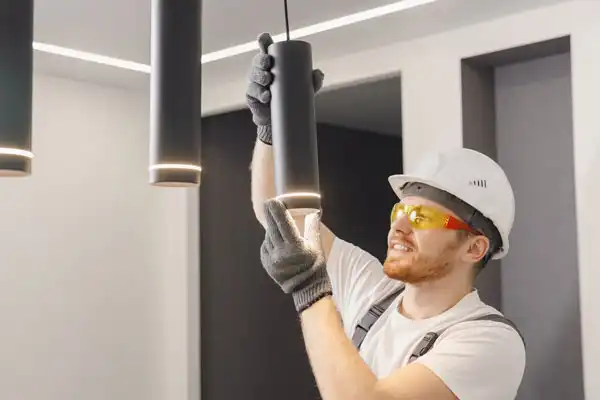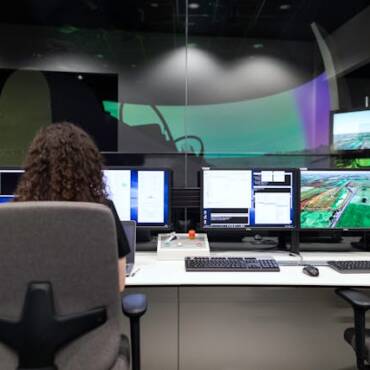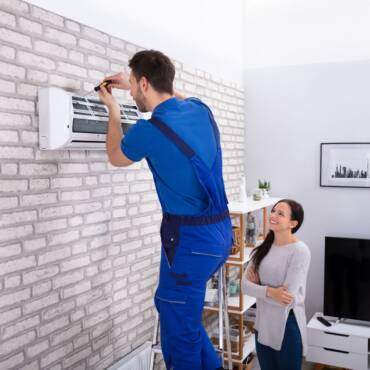If you’re a homeowner in Tennessee, you’ve probably heard a lot of buzz about UV lights for HVAC systems. But what exactly do they do, and do you really need them?
UV lights, or ultraviolet lights, are more than just a fancy addition to your home’s HVAC system; they serve a practical purpose. They work by using a type of electromagnetic radiation to target and destroy harmful microorganisms such as bacteria, viruses, and mold that could be circulating through your home. This makes them particularly useful for improving indoor air quality, which is a significant concern for many households today.
Pioneer Heating, Cooling & Plumbing have created this guide to help you understand what UV lights do and how they can benefit your home’s HVAC system.
Understanding The Role of UV Lights in Home HVAC
In addition to enhancing air quality, UV lights can also make your HVAC system more efficient. By eliminating the buildup of contaminants on critical components, these lights help maintain proper airflow and system performance. This can potentially save you money on energy bills and reduce the frequency of repairs.
However, it’s not just a plug-and-play solution. Installing UV lights in your HVAC system requires careful consideration and professional expertise to ensure they’re set up correctly. So, while the idea of breathing cleaner air might sound appealing, it’s essential to weigh both the benefits and the costs involved.
Understanding what UV lights can do for your HVAC system will help you make an informed decision about whether they’re the right fit for your home.
How UV Lights Work
UV lights, or ultraviolet lights, are a type of electromagnetic radiation that’s invisible to the naked eye but packs a powerful punch. When it comes to HVAC systems, these lights are usually placed in the ductwork or near the air handler. The magic happens when air passes through these UV-lit areas. As the air circulates, the UV lights zap harmful microorganisms like bacteria, viruses, and mold. By breaking down the DNA of these unwanted guests, UV lights effectively neutralize them, making the air in your home cleaner and healthier.
One key point to note is that UV lights work continuously, meaning they are always on guard, disinfecting the air as it flows through your HVAC system. This ongoing action not only improves air quality but also helps keep your HVAC components cleaner. Less buildup of contaminants means your system can operate more efficiently, potentially lowering your energy bills and reducing the need for frequent repairs.
It’s also worth mentioning that the placement of UV lights is strategic. They’re positioned where they can do the most good—near the evaporator coil or within the ductwork—to maximize their exposure to circulating air. This ensures that as much air as possible gets treated, offering you the best chance at a healthier home environment.
With this understanding, you can see how UV lights contribute to both cleaner air and a more efficient HVAC system.
Benefits of Using UV Lights
When you integrate UV lights into your HVAC system, you’re taking a significant step toward improving your home’s indoor air quality. UV lights work around the clock to kill bacteria, viruses, and mold, which means cleaner air for you and your family. This is particularly beneficial for those with allergies or respiratory issues. By eliminating these contaminants, UV lights also help to reduce odors, making your home smell fresher.
Another notable advantage is the potential for lower maintenance needs. When your HVAC components are cleaner, there’s less dust and debris accumulating, which means fewer breakdowns and longer-lasting equipment. This can save you money on repairs and extend the lifespan of your system.
Additionally, a cleaner HVAC system operates more efficiently. When your system doesn’t have to work as hard to push air through clogged ducts or dirty coils, it uses less energy. This can translate to noticeable savings on your energy bills over time.
UV lights are also relatively low maintenance themselves. While the bulbs do need to be replaced periodically, they generally last about a year, and the process is straightforward for a professional technician like the HVAC pros at Pioneer Heating, Cooling & Plumbing.
Overall, incorporating UV lights into your HVAC system offers multiple benefits, from healthier air and fewer odors to cost savings and reduced maintenance. If you’re looking to improve your home’s air quality and make your HVAC system more efficient, UV lights could be a worthwhile investment.
Potential Drawbacks
While UV lights offer many benefits, they do have some drawbacks to consider. One of the biggest concerns is the upfront cost. Depending on your HVAC system’s size and complexity, the initial installation can be pricey. Additionally, UV lights require ongoing upkeep. The bulbs need to be replaced regularly, usually about once a year, to maintain their effectiveness. This means you’ll have to factor in the cost of replacement bulbs and possibly the expense of hiring a professional to change them.
Another issue to be aware of is that UV lights can generate ozone if not properly designed. Although most modern UV lights are designed to minimize ozone production, it’s still something to watch out for, as ozone can be harmful to your health.
There’s also the consideration of energy consumption. While UV lights can help your HVAC system run more efficiently, they do use electricity. This means you’ll see a slight increase in your energy bills, although it might be offset by the savings from a more efficient HVAC system.
Lastly, UV lights are not a one-size-fits-all solution. They work best in specific conditions and may not be as effective in every home. It’s important to evaluate your home’s needs and consult with an HVAC professional from Pioneer Heating, Cooling & Plumbing to determine if UV lights are the right choice for you.
Determining the Need for UV Lights
Figuring out if UV lights are a good fit for your HVAC system involves a few key considerations. Start by taking a look at your current HVAC setup. Is your system older or prone to frequent breakdowns? If so, adding UV lights could help by keeping components cleaner and potentially extending the system’s lifespan.
Next, think about your household’s health needs. If someone in your home suffers from allergies or respiratory issues, improving indoor air quality becomes even more critical. UV lights can help reduce airborne irritants like mold, bacteria, and viruses, offering some relief.
Also, evaluate the general air quality in your home. Do you notice persistent odors or feel like your home is dustier than it should be? These could be signs that your HVAC system is struggling to keep up with contaminants, and UV lights might be beneficial.
Lastly, it’s worth considering your energy bills. A more efficient HVAC system can save you money in the long run, and UV lights can contribute to that efficiency by keeping key components free from buildup. Consulting with an HVAC professional from Pioneer Heating, Cooling & Plumbing can give you a clearer picture of whether UV lights would be a worthwhile investment for your specific situation. They can assess your system and provide personalized advice based on your home’s needs.
Installation in HVAC Systems
Installing UV lights in your HVAC system isn’t something to take lightly. It’s all about getting the placement right. Usually, the lights go in the ductwork or near the evaporator coil where they can have the most impact on the air moving through your system. This placement helps the UV lights effectively neutralize microorganisms, enhancing both the efficiency and the air quality of your HVAC setup. Proper installation is key to ensuring that these lights can do their job without causing issues like unwanted ozone production. That’s why it’s a good idea to consult with an HVAC professional. They know how to position the lights correctly and can ensure that everything is set up for optimal performance.
Importance of Professional Installation and Maintenance
Installing UV lights in your HVAC system is not a DIY project. The proper placement of these lights is crucial for them to be effective in neutralizing microorganisms and ensuring they don’t cause issues like unwanted ozone production. That’s why it’s always a smart move to consult with an HVAC professional from Pioneer Heating, Cooling & Plumbing. These experts have the experience to position the lights correctly and make sure everything is set up to operate at its best.
Beyond installation, regular maintenance is key to keeping your HVAC system running smoothly. Professionals will check the UV lights, replace bulbs as needed, and inspect the overall health of your HVAC setup. This maintenance can help you avoid unexpected breakdowns and keep your system running efficiently, which can save you money on energy bills in the long run.
Also, having a pro handle the job gives you peace of mind. They can identify and fix potential issues before they become major problems, ensuring that your system is always in top shape. In Tennessee, where hot summers and cold winters can put a strain on HVAC systems, professional maintenance is especially important. It can extend the lifespan of your system and improve indoor air quality, making your home a healthier place to live.
So, while it might seem like an added expense, professional installation and maintenance of UV lights in your HVAC system are investments that pay off in the long term. You get the benefits of cleaner air and a more efficient system without the hassle of trying to do it yourself.
Want to learn more about UV lighting and how it can benefit your home’s HVAC? Give Pioneer Heating, Cooling & Plumbing a call or book an appointment online.
Whether you require installation, repair, or maintenance, our technicians will assist you with top-quality service at any time of the day or night. Take comfort in knowing your indoor air quality is the best it can be with MOE heating & cooling services Ontario's solution for heating, air conditioning, and ventilation that’s cooler than the rest.
Contact us to schedule a visit. Our qualified team of technicians, are always ready to help you and guide you for heating and cooling issues. Weather you want to replace an old furnace or install a brand new air conditioner, we are here to help you. Our main office is at Kitchener but we can service most of Ontario's cities
Source link



